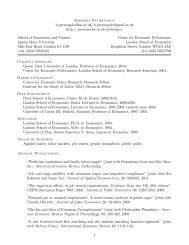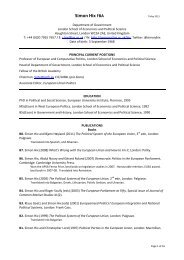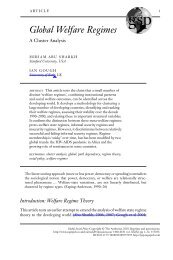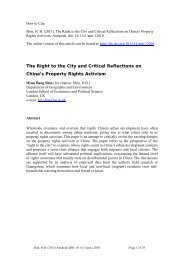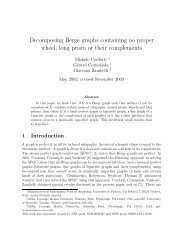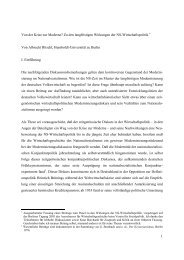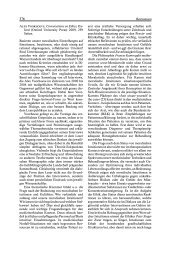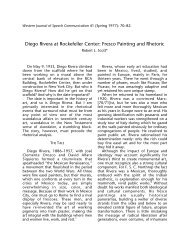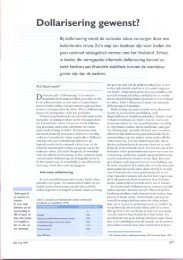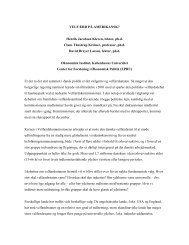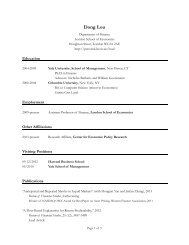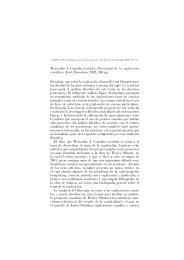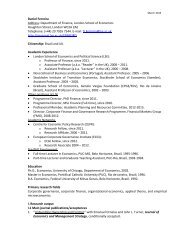The Rejected, the Ejected, and the Dejected: Explaining ...
The Rejected, the Ejected, and the Dejected: Explaining ...
The Rejected, the Ejected, and the Dejected: Explaining ...
You also want an ePaper? Increase the reach of your titles
YUMPU automatically turns print PDFs into web optimized ePapers that Google loves.
Benedetto, Hix / Government Rebels in House of Commons 771<br />
To assess <strong>the</strong> impact of Labour MPs’ policy preferences on <strong>the</strong>ir voting<br />
behavior, Model 2 uses <strong>the</strong> same specification as in Model 1 but with <strong>the</strong><br />
sample of 131 MPs who responded to <strong>the</strong> left-right self-placement question<br />
in <strong>the</strong> survey. <strong>The</strong> results in Model 2 are identical to those in Model 1 for<br />
all <strong>the</strong> main variables.<br />
Model 3 <strong>the</strong>n adds <strong>the</strong> effect of policy preferences. <strong>The</strong> results reveal<br />
that <strong>the</strong> fur<strong>the</strong>r left that a Labour MP is, <strong>and</strong> <strong>the</strong> fur<strong>the</strong>r he or she was from<br />
<strong>the</strong> median member of <strong>the</strong> party, <strong>the</strong> more likely he or she was to vote<br />
against <strong>the</strong> government. Also, <strong>the</strong> results for <strong>the</strong> o<strong>the</strong>r variables remain<br />
unchanged after <strong>the</strong> two policy-preference variables are added.<br />
Model 4 <strong>the</strong>n adds <strong>the</strong> three interaction terms, <strong>and</strong> as a robustness check,<br />
Model 5 replicates Model 4 using a Poisson regression model, in which <strong>the</strong><br />
dependent variable is <strong>the</strong> number of times that a Labour MP voted against<br />
<strong>the</strong> government. <strong>The</strong> results are almost identical in <strong>the</strong>se two models.<br />
Interpreting <strong>the</strong> significance of <strong>the</strong> variables <strong>and</strong> <strong>the</strong> magnitude of <strong>the</strong><br />
effects in <strong>the</strong>se last two models is not straightforward because of <strong>the</strong> inclusion<br />
of <strong>the</strong> interaction terms (e.g., Braumoeller, 2004). Hence, to investigate<br />
<strong>the</strong> magnitude <strong>and</strong> significance of <strong>the</strong> effects, Figures 2 <strong>and</strong> 3 show <strong>the</strong> predicted<br />
relationships between <strong>the</strong> preferences of an MP, his or her office<br />
status or constituency situation, <strong>and</strong> <strong>the</strong> likelihood that he or she will rebel.<br />
Figure 2 shows that former ministers with centrist preferences did rebel<br />
slightly more than o<strong>the</strong>r Labour MPs, although <strong>the</strong>re are insufficient former<br />
ministers with outlying preferences to tell <strong>the</strong> difference between former ministers<br />
<strong>and</strong> o<strong>the</strong>r Labour MPs at <strong>the</strong>se positions on <strong>the</strong> left-right scale. Also, backbenchers<br />
who have not been promoted were only different from o<strong>the</strong>r Labour<br />
MPs <strong>and</strong> former ministers if <strong>the</strong>y were considerably to <strong>the</strong> left of <strong>the</strong> average<br />
Labour MP. Figure 3, meanwhile, shows that Labour MPs in marginal seats<br />
were more loyal than were Labour MPs in safe seats, even if <strong>the</strong>y had preferences<br />
considerably to <strong>the</strong> left or to <strong>the</strong> right of <strong>the</strong> average Labour MP.<br />
Rebellions on <strong>the</strong> Iraq War,<br />
Hospital Reform, <strong>and</strong> University Fees<br />
Table 3 presents <strong>the</strong> results of <strong>the</strong> analysis of <strong>the</strong> three individual votes.<br />
No single set of factors explains Labour rebellions in <strong>the</strong>se votes. In all<br />
three votes, not-promoted MPs <strong>and</strong> former ministers were more likely to<br />
rebel than o<strong>the</strong>r MPs. Also, <strong>the</strong> policy preferences of Labour MPs, as<br />
measured by <strong>the</strong>ir left-right self-placement, mattered in all three votes, but<br />
in slightly different ways. Right-wing MPs were less likely to vote against<br />
Downloaded from<br />
http://cps.sagepub.com at SWETS WISE ONLINE CONTENT on July 6, 2007<br />
© 2007 SAGE Publications. All rights reserved. Not for commercial use or unauthorized<br />
distribution.



